Iran Official Issues Threat Amidst Rising US Presence In Persian Gulf
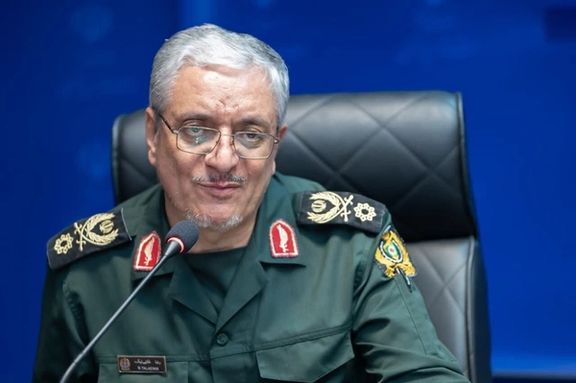
An Iranian defense ministry official has issued a threat to the US amidst its rising military presence in the Persian Gulf.

An Iranian defense ministry official has issued a threat to the US amidst its rising military presence in the Persian Gulf.
Referring to Iran's latest long-range missile, which has a range of 1,000 kilometers, Reza Talaei-Nik, the Spokesman of the Ministry of Defense, said: "The enemies should move away from the country's coasts within the range of the Abu Mahdi missile, and those who intend to create insecurity in the region should change their mind."
Thousands of Marines backed by advanced US fighter jets and warships are building up a greater presence in the Persian Gulf in the face of Iran's harassment of commercial vessels in the Persian Gulf.
The dispatch of the troop-and- the USS Bataan expeditionary unit to the region, alongside stealth F-35 fighters and other warplanes, has put the regime on the back foot.
Talaei-Nik warned that those who want to pose a threat should withdraw beyond the 1000-kilometer range of Abu Mahdi sea cruise missiles that "can evade radar."
The Abu Mahdi missile, made in Iran, can reach the entire Persian Gulf Sea, the Sea of Oman, and a portion of the Indian Ocean, according to Talaei-Nik.
Earlier Iran’s Defense Minister, Mohammad Reza Ashtiani hailed the addition of the Abu Mahdi missile to Iran's naval fleet claiming that the missile system's advanced artificial intelligence capabilities enables it to adeptly evade radar systems.
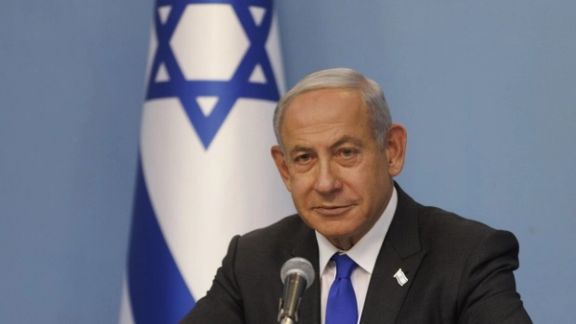
Israeli Prime Minister Benjamin Netanyahu reaffirmed Israel's Iran strategy despite Biden's recent nuclear deal efforts.
In an interview with Newsmax on Monday, he reiterated his policy on Iran, its most dangerous enemy in the Middle East, and said he will not be deterred by the Biden administration's efforts to restart a nuclear deal with Iran.
"Israel will do what it needs to do to defend itself by itself against the threat of Iran to annihilate it with nuclear weapons," Netanyahu told Rob Schmitt Tonight.
The Biden administration has been striving to bring the United States back into the Joint Comprehensive Plan of Action (JCPOA), a deal that was previously abandoned under the Trump administration. Talks are also said to be addressing the release of some of the US citizens detained in Iran and unfreezing some Iranian assets. It has been met with fierce opposition on both sides of Congress and since the latest talks began in June, maritime tensions continue between the two arch-enemies in the Persian Gulf.
Netanyahu said of the ongoing US talks: "I think that any deal with Iran that doesn't set back Iran's nuclear infrastructure is basically not worth it because it means nothing ... They basically take what you give them, but they don't set back. They don't roll back the capacity to produce nuclear weapons or the components of nuclear weapons. So, you really get nothing for it. And my view hasn't changed."
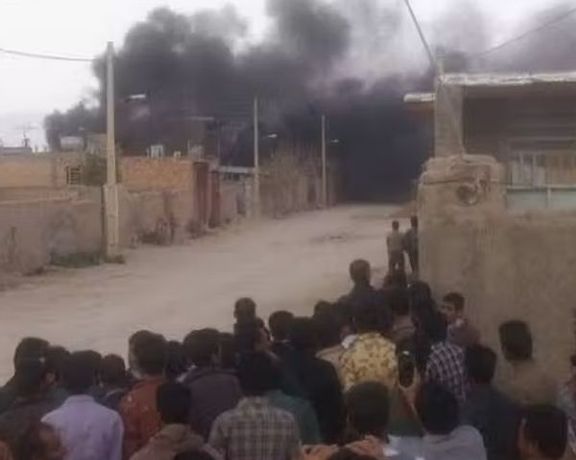
The IRGC surrounded a village in Iran’s West Azarbaijan province after clashes erupted between civilians and security forces.
Violence broke out after residents of Agh-Darreh village in Takab had protested the arrest of family members in front of the governorate of Takab city. In what is believed to have been a case of excessive force, police and security forces turned violent, causing the IRGC to send troops to surround the village.
Hengaw Human Rights Organization reported that the situation escalated with over 50 Kurdish citizens being arrested and more than 10 people sustaining injuries. Furthermore, dozens of other citizens have sought refuge in the surrounding mountains, fearing arrest.
The majority of Iran's 10 million Kurds live in the western parts of the country, which has been subject to consistent suppression from security forces in the wake of Kurdish-Iranian Mahsa Amini's death in morality police custody. It has been the scene of numerous violent protests and even more brutal crackdowns by the regime with hundreds believed to have been killed in state-sanctioned violence.
The area's residents were also protesting a lack of jobs at the local gold mine, with the villagers among some of Iran's poorest citizens. Despite promises of employment from provincial authorities, the situation remains unresolved and the economic situation worsening.
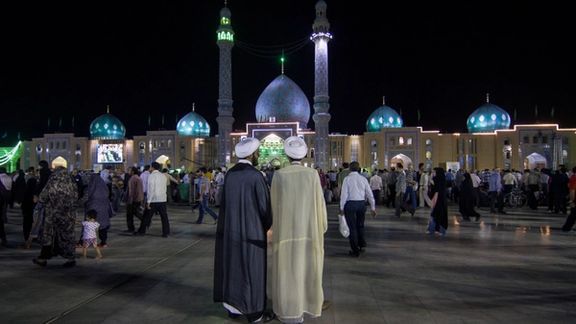
Iranians are outraged by the regime’s hypocrisy after recent sex scandals surrounding a “morality” watchdog official and a cleric have been revealed.
In the past three weeks, Radio Gilan, a Telegram channel run by Payman Behboudi, a Germany-based journalist, has released three different videos that have raised a storm on Persian social media.
In the first video, a male City Council member of Bandar Anzali in the northern province of Gilan, was seen smoking opium and masturbating. The second video showed an official engaging in sex with a young man, and the third, released two days ago, shows a cleric engaged in sex with the husband of his wife’s sister. Radio Gilan has also published several screenshots of a sex chat between the cleric, Mehdi Haghshenas, and his brother-in-law.
Many social media users say they are outraged by the hypocrisy of the regime and its affiliated clerics and officials rather than the same-sex relationships between consenting adults.
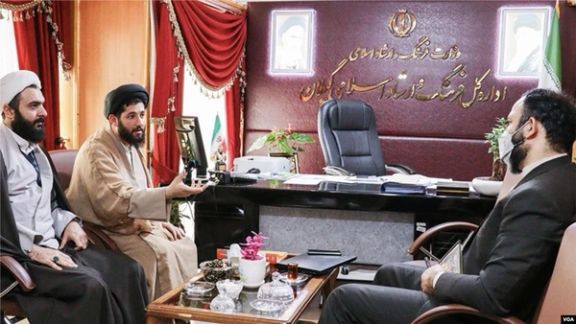
The scandals of clerics and regime officials to many is a reminder of a famous 13th century verse by the nationally revered Hafez Shirazi who said clerics “shine” when they preach at the pulpit but when in private, they commit the same sins they tell the people to shun, an Iranian observer who asked not to be named told Iran International.
“Corruption has become institutionalized in the system and loyalty has turned into a commodity that can be bought and sold. But this is not the main problem: Value paradigms have been all lost too. What they preach to people is no longer credible to anyone anymore, even to many of their diehard supporters,” he added.
Haghshenas whose sex chats and video of sex with his brother-in-law has raised a storm on social media was appointed as the secretary of Gilan headquarters of the state organization for amr-e be marouf, that is, calling others to enjoin what is good and forbid them from doing what is wrong.
The official in charge of promoting Islamic values held the position until a journalist filed a complaint against him with the Special Court for Clergy and presented his sex chats, which the court apparently found authentic, as evidence.
Radio Gilan claims that Ayatollah Rasoul Falahati, Supreme Leader Ali Khamenei’s representative in the province, helped sweep the case under the carpet so Haghshenas was removed from his position without further punishments.
In December 2017, Vida Movahed, a young woman, removed her white headscarf, put it on a stick and climbed on top of a utility box on a busy Tehran street waving the stick. She was immediately arrested and held for a month for “injuring” the feelings of the society by her “immoral action”. A photo of her protest action went viral on social media and sparked a movement against compulsory hijab that came to be known as White Wednesdays.
Haghshenas staged a protest against Movahed’s “immorality” holding a banner that said, “I Am a Revolutionary” while standing on a pedestal on the street to mimic Movahed’s action.
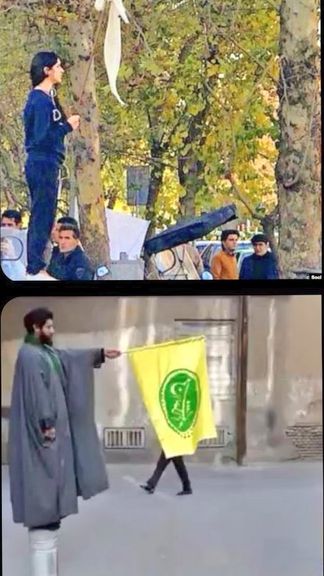
Iran’s sharia-based penal code prescribes a death sentence for penetrative same-sex relations between adult men. Non-penetrative sexual acts are punished with lashes until the fourth offense, when they are punished with death. The sentence has been carried out in several cases including in November 2005 when the Islamic Republic publicly hung two men, Mokhtar N. (24) and Ali A. (25), in Gorgan in northern Iran.
Sexual acts between women, which are defined differently, are punished with lashes until the fourth offense, when they are also punished with death.
“These abuses have created an atmosphere of terror for lesbians, gays, bisexuals and transgender people throughout Iran,” said Jessica Stern, a research with the Lesbian, Gay, Bisexual and Transgender Rights Program at Human Rights Watch at the time of the execution of the two young men.
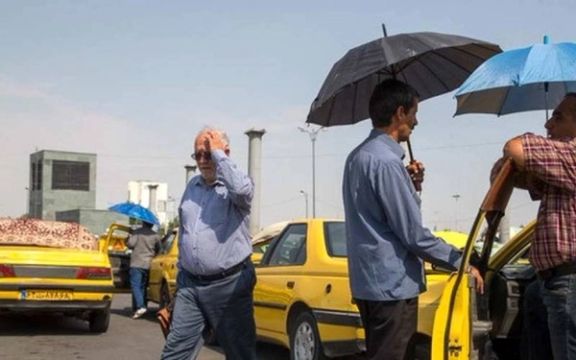
Due to a heat wave across the country, the Iranian government has declared a national holiday on Wednesday and Thursday.
The government claims the move is to safeguard the well-being of its citizens as soaring temperatures continue to pose health risks, though it raises questions as to the country's readiness for a crisis amidst an already overburdened health system.
Last month, Iran International reported that the system needs 60,000 personnel to cope with rising demands amidst a collapsing economy and a disappearing workforce.
Ali Bahadori Jahromi, the government's spokesperson, took to Twitter on Tuesday to announce the decision, stating, "In view of the unprecedented heat in the current days, in order to protect the health of the citizens, the government agreed with the proposal of the Ministry of Health to close on Wednesdays and Thursdays throughout the country."
Sadegh Ziyaian, the head of the National Center for Forecasting and Crisis Management of Weather Risks, reported an alarming increase in temperatures. The southern city of Ahvaz in particular is expected to experience temperatures of up to 50 and 51 degrees celsius during Tuesday and Wednesday, becoming the hottest center of the province.
Ziyaian also warned that the capital, Tehran, will witness temperatures reaching up to 40 degrees Celsius on Thursday.
In light of the extreme weather conditions, the Ministry of Health issued a public advisory, urging special attention to vulnerable groups. Children under four years old, individuals over 65 years old, and those with pre-existing health conditions are at higher risk of heatstroke.
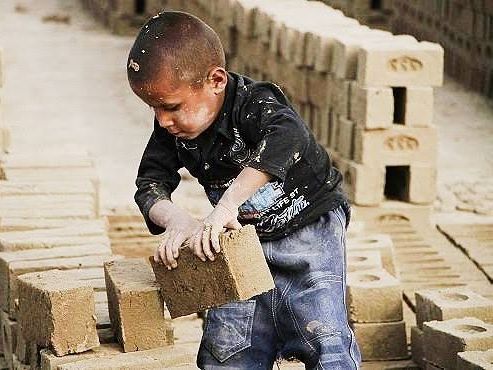
Iran's Parliament Research Center has released a report highlighting an alarming rise in the number of working children.
The report indicates that 15% of the child population is now engaged in labor activities. At least 10% of working children do not have the opportunity to attend school, depriving them of essential educational opportunities.
While the exact number of working children in Iran remains undisclosed, the Ministry of Labor indicated that in 2017, out of nine million Iranian children, 499,000 were considered "active," signifying that nearly half a million children in the country were either engaged in labor or searching for work.
The report suggests that the population of working children has now reached approximately one million and 350,000 individuals, based on an estimated 15% involvement in child labor.
The primary reason attributed to the growing phenomenon of child labor is "household poverty" which forces children to work to support their families' financial needs.
The report underscores that child labor is prohibited and criminalized by both international and domestic laws, obliging the government to implement necessary measures to address and reduce this issue. However, monitoring and preventing child labor have proven to be challenging, particularly in cases of household work, labor in difficult and unsupervised areas, illegal activities like drug trafficking, and instances of sexual abuse of children.